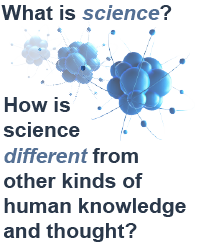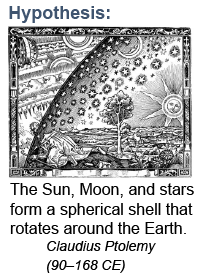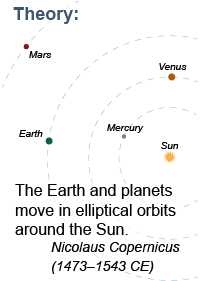|
 Science is the systematic study of the structure and behavior of the physical and natural world. Systematic refers to the system of logic by which scientific ideas are proposed, modified or rejected based on comparison with observational evidence. Science is also a body of knowledge about the physical and natural world including elements such as facts and theories. Science includes only that knowledge which can be tested and confirmed by comparison with objective, repeatable, and observational evidence. If an idea cannot be supported or refuted by comparison with observational evidence, then that idea, true or not, cannot be part of science.
Science is the systematic study of the structure and behavior of the physical and natural world. Systematic refers to the system of logic by which scientific ideas are proposed, modified or rejected based on comparison with observational evidence. Science is also a body of knowledge about the physical and natural world including elements such as facts and theories. Science includes only that knowledge which can be tested and confirmed by comparison with objective, repeatable, and observational evidence. If an idea cannot be supported or refuted by comparison with observational evidence, then that idea, true or not, cannot be part of science. 
|
Hypotheses and theories
|
Science cannot answer ethical questions such as whether something is good or bad. As an example, the question of whether or not Earth’s average temperature is increasing has a scientific answer based on measurable, objective data. The ethical question of whether it is good or bad if Earth’s temperature increases, however, is not answerable by science. Questions of judgment, preference, ethics, or morality cannot be answered by science. These areas of thought are important! They are just not part of science. 
|
 A hypothesis is a tentative explanation or conclusion about some aspect of the physical world. Hypotheses do not have to be right! The logic of science begins by assuming a hypothesis is correct and then seeking scientific evidence that either supports or refutes the hypothesis. Hypotheses are
A hypothesis is a tentative explanation or conclusion about some aspect of the physical world. Hypotheses do not have to be right! The logic of science begins by assuming a hypothesis is correct and then seeking scientific evidence that either supports or refutes the hypothesis. Hypotheses are - tentative statements, which may or may not be correct,
- testable statements, which may be evaluated by comparison with objective scientific evidence, and
- necessary and fundamental steps in the construction of reliable scientific theories.

|
A scientific theory is a comprehensive and well-tested explanation of a natural or physical phenomenon. Unlike hypotheses, scientific theories are well established and highly reliable explanations that have been tested by multiple, independent researchers over a long period of time and under a wide range of conditions. Only hypotheses that have correctly explained a range of phenomena over a long time are incorporated into scientific theories. 
| 
|
The word theory in science does not mean hunch or guess. Although scientific theories are always being tested, and occasionally proved wrong, scientific theories represent our best, most reliable knowledge about the natural or physical world. 
|
| |
|

